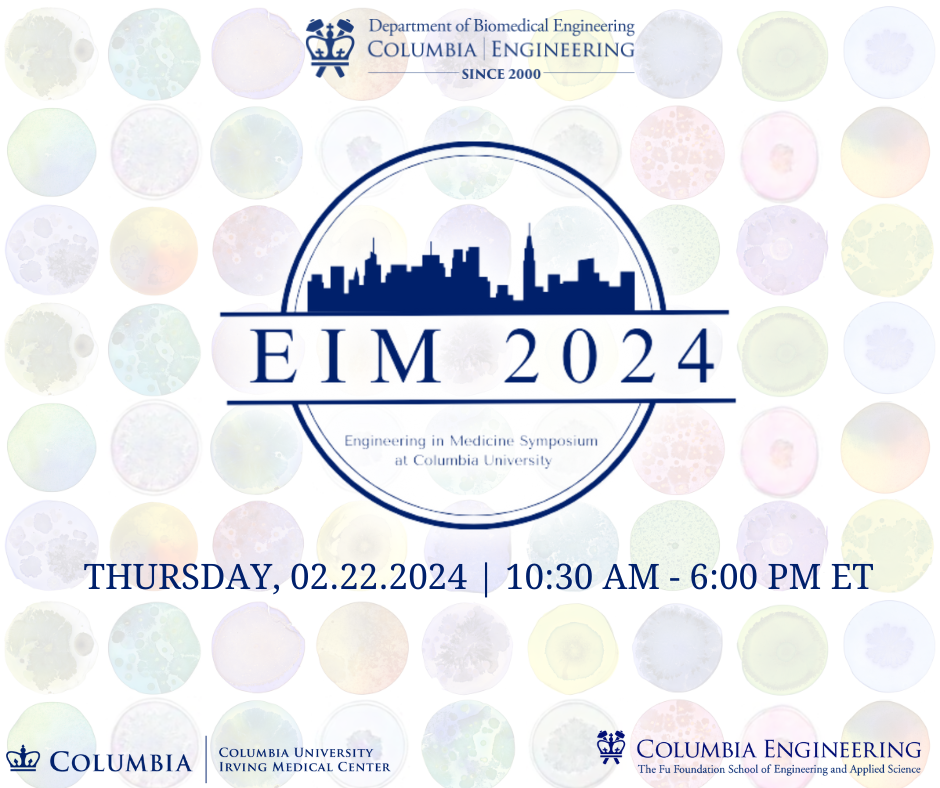Columbia University 8th Annual Engineering in Medicine Symposium - February 22, 2024
ABOUT THE SYMPOSIUM
HOSTS
The Fu Foundation School of Engineering and Applied Science
&
Columbia University Irving Medical Center
EVENT DETAILS
Thursday, February 22, 2024
10:30 a.m. - 6:00 p.m. EST
Register now for a virtual ticket!
Join us virtually for a day of presentations and networking as we explore the interface of engineering and medicine and the path from bench to bedside. With opening remarks anticipated by Columbia Engineering Dean, Shih-Fu Chang, and Columbia College of Physicians and Surgeons Dean, Katrina Armstrong, the symposium comprises five sessions showcasing the role of engineering in the fields of Single Cell, Machine Learning, Neuroscience of Decision-Making, Development + Aging, and Tissue Engineering + Instructive Biomaterials.
SYMPOSIUM CHAIRS
Elham Azizi, PhD
Assistant Professor of Biomedical Engineering; Herbert and Florence Irving Assistant Professor of Cancer Data Research
Jose L. McFaline-Figueroa, PhD
Assistant Professor of Biomedical Engineering
Please direct any questions to [email protected]
OPENING REMARKS
Shih-Fu Chang, PhD
Dean of The Fu Foundation School of Engineering and Applied Science; Morris A. and Alma Schapiro Professor of Engineering; Professor of Electrical Engineering and Computer Science
Katrina Armstrong, MD
Executive Vice President for Health and Biomedical Sciences; Dean of the Faculties of Health Sciences and the Vagelos College of Physicians and Surgeons; Chief Executive Officer of Columbia University Irving Medical Center; Harold and Margaret Hatch Professor in the Faculty of Medicine
PROGRAM
REGISTRATION
Register for a virtual ticket!
SPEAKERS
Treena Arinzeh, PhD
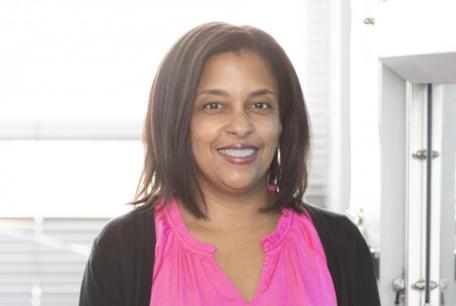
Treena Livingston Arinzeh, PhD, Professor of Biomedical Engineering, Director of the Tissue Engineering and Active BioMaterials Laboratory
Treena Livingston Arinzeh, PhD is a Professor of Biomedical Engineering at Columbia University. She is also a co-leader of an Integrated Research Thrust (IRT) and the Director of Diversity of the NSF Science and Technology Center for Engineering Mechanobiology (CEMB). Dr. Arinzeh received her B.S. from Rutgers University in Mechanical Engineering, her M.S.E. in Biomedical Engineering from Johns Hopkins University, and her Ph.D. in Bioengineering from the University of Pennsylvania. She was a project manager at the stem cell technology company, Osiris Therapeutics, Inc. and was a founding faculty member of the Biomedical Engineering faculty at the New Jersey Institute of Technology. She is a fellow of the American Institute for Medical and Biological Engineering (AIMBE), the Biomedical Engineering Society (BMES) and the National Academy of Inventors.
Katrina Armstrong, MD
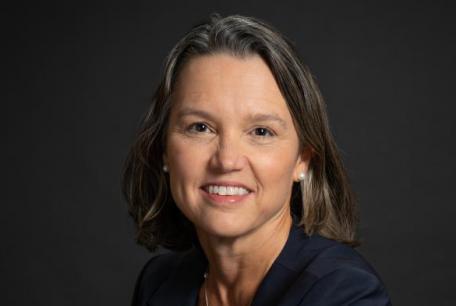
Executive Vice President for Health and Biomedical Sciences; Dean of the Faculties of Health Sciences and the Vagelos College of Physicians and Surgeons; Chief Executive Officer of Columbia University Irving Medical Center; Harold and Margaret Hatch Professor in the Faculty of Medicine
Katrina Armstrong, MD, leads Columbia University’s medical campus as the Chief Executive Officer of CUIMC, which includes the Vagelos College of Physicians and Surgeons (VP&S), the School of Nursing, the College of Dental Medicine, and the Mailman School of Public Health. She also is Executive Vice President for Health and Biomedical Sciences for Columbia University and Dean of the Faculties of Health Sciences and the Vagelos College of Physicians and Surgeons. As VP&S dean, Dr. Armstrong leads the nation’s second oldest medical school and the first to award an MD degree. Trained as an epidemiologist, she is an internationally recognized investigator in health disparities, quality of care, and cancer prevention and outcomes, an award-winning teacher, and a practicing general internist. She has served on multiple advisory panels for academic and federal organizations and has been elected to the National Academy of Medicine, the American Academy of Arts and Sciences, the Association of American Physicians, and the American Society for Clinical Investigation. Before joining Columbia, Dr. Armstrong was the Jackson Professor of Clinical Medicine at Harvard Medical School, Chair of the Department of Medicine and Physician-in-Chief of Massachusetts General Hospital, and Professor of Epidemiology at the Harvard T.H. Chan School of Public Health. Before joining Harvard, she was Chief of the Division of General Internal Medicine, Associate Director of the Abramson Cancer Center, and Co-Director of the Robert Wood Johnson Clinical Scholars Program at the University of Pennsylvania. She is a graduate of Yale University (BA degree in architecture), Johns Hopkins (MD degree), and the University of Pennsylvania (MS degree in clinical epidemiology). She completed her residency training in internal medicine at Johns Hopkins.
Grace McIlvain
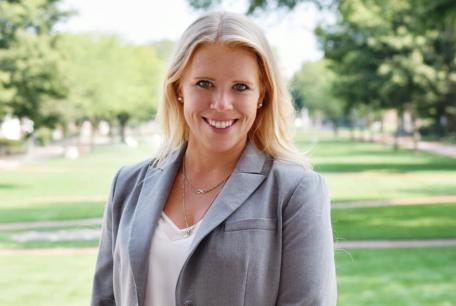
Grace McIlvain, Assisant Professor of Biomedical Engineering
Dr. McIlvain works on the development of quantitative magnetic resonance imaging (MRI) methods for understanding the microstructural properties of the human brain. Specifically, she works to optimize and utilize a technique called magnetic resonance elastography (MRE), which is a noninvasive method for analyzing tissue mechanical properties. Mechanical properties are sensitive to tissue microstructural composition and organization which are strong biomarkers of tissue health. These measures have shown efficacy in identifying age related brain changes, characterizing brain tumors, detecting neurodegenerative diseases, and reflecting cognitive function. MRE is more sensitive to tissue microstructure than other non-invasive imaging modalities and captures a unique aspect of brain structure, making well suited for detection of disease and quantification of cognitive function.
Elizabeth Olson
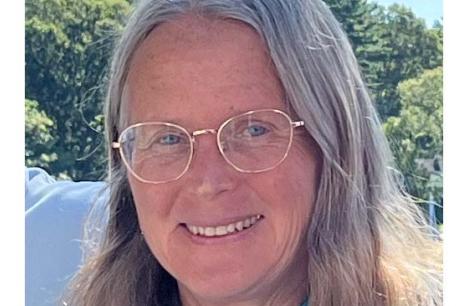
Elizabeth Olson, Professor, Biomedical Engineering; Professor, Auditory Biophysics (in Otolaryngology/Head and Neck Surgery)
Elizabeth (Lisa) Olson has been on the Columbia faculty since 2001, with current appointments in Otolaryngology and BME. Her BA and PhD degrees in Physics are from Barnard College and MIT. As a graduate student she studied frequency tuning in electroreceptors of electric fish. As a post doc she transitioned to the auditory system, where she studies auditory mechanics, focusing on the electromechanical basis for the frequency selectivity of the inner ear. For the past decade she has worked with colleagues at Columbia, MIT and Mass Eye and Ear to devise an implantable microphone for a fully implanted cochlear implant.
Shih-Fu Chang, PhD
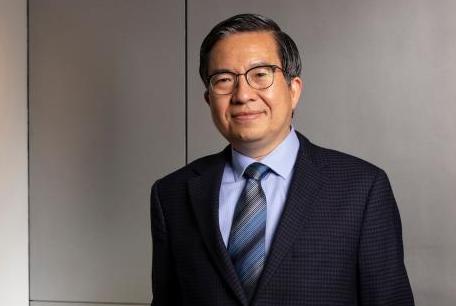
Dean of Columbia Engineering; Morris A. and Alma Schapiro Professor in Electrical Engineering and Computer Science
Shih-Fu Chang is dean of Columbia Engineering, where he leads the School's education, research, and innovation mission. His research is focused on computer vision, machine learning, and multimedia information retrieval. A primary goal of his work is to develop intelligent systems that can extract rich information from the vast amount of visual data including those emerging on the Web, collected through pervasive sensing, or available in gigantic archives. His work on content-based visual search in the early 90’s set the foundation of this vibrant area. Over the years, he has developed innovative solutions for image/video recognition, multimodal analysis, multimedia ontology, image forensics, and compact hashing for large-scale search.
José L. McFaline-Figueroa
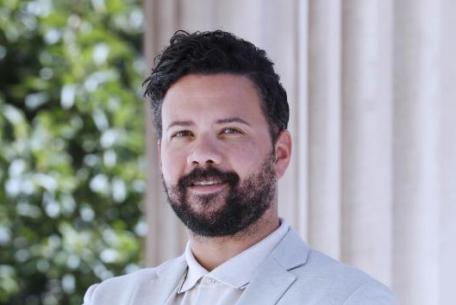
José L. McFaline-Figueroa, PhD, Assistant Professor of Biomedical Engineering
José L. McFaline-Figueroa received his B.S. in Chemistry from the University of Puerto Rico at Mayagüez, his Ph.D. in Cancer Cell Biology from MIT and performed post-doctoral research at the University of Washington. In January 2021, José joined the Department of Biomedical Engineering at Columbia University. His laboratory develops multiplex single-cell genomics tools to define the molecular determinants of cellular response to therapy. José’s work has been recognized by various awards, including the NIH National Human Genome Research Institute’s Genomic Innovator Award, the NSF Career Award and the Allen Institute Distinguished Investigator Award.
Sara Zaccara
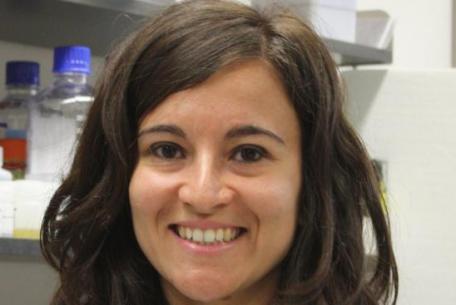
Sara Zaccara, Assistant Professor Herbert and Florence Irving Assistant Professor of Cancer Data Research (in the Herbert and Florence Institute for Cancer Dynamics)
During my postdoc at Weill Cornell in the lab of Samie Jaffrey, I acquired extensive experience in studying the epitranscriptome. In particular, I made significant contributions to elucidate how m6A plays an essential role in controlling mRNA fate and demonstrating the importance of such a proposed mechanism in acute myeloid leukemia. Started at Columbia in September 2022, with the aim of combining innovative sequencing technologies, high throughput pooled genetic screens, and advanced data analyses to systematically interrogate this level of regulation in normal and disease states.
Ricardo Cruz-Acuña
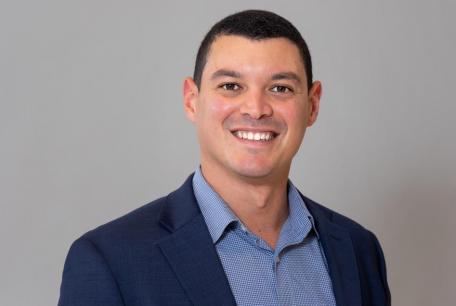
Ricardo Cruz-Acuña, Assistant Professor of Cancer Engineering; College of Dental Medicine
Ricardo Cruz-Acuña is an Assistant Professor of Cancer Engineering in the College of Dental Medicine at Columbia University Irving Medical Center. In his lab, Dr. Cruz-Acuña focuses on integrating aspects of biomaterial engineering, cell and molecular biology, and 3D organoid biology to (1) understand the contributions of the extracellular matrix properties to tumorigenesis, and (2) identify mechanisms important for esophageal developmental patterning and organogenesis. His work will help elucidate how cancer progresses within a dynamically evolving extracellular matrix that modulates every behavioral facet of the tumor cells, and will reveal novel mechanisms that drive human esophageal development.
Brent Stockwell
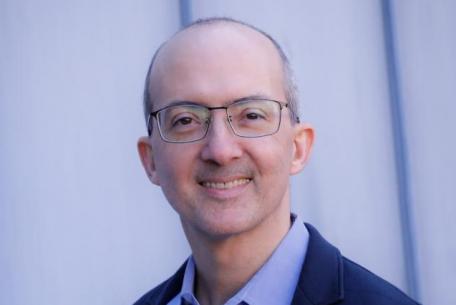
Brent Stockwell, William R. Kenan, Jr. Professor of Biological Sciences, Professor of Chemistry and of Pathology and Cell Biology
Brent Stockwell, PhD, is the William R. Kenan Jr. Professor of Biological Sciences; Chair of the Department, and Professor of Chemistry, and of Pathology and Cell Biology. He discovered a form of cell death known as ferroptosis. He is a member of the National Academy of Medicine, and received a Beckman Young Investigator Award, an HHMI Early Career Scientist Award, and an NCI R35 Outstanding Investigator Award, among others. He has been in the top one percent of highly cited researchers the last four years and was named one of the 50 most influential life science individuals in New York.
Hasan Erbil Abaci
Hasan Erbil Abaci, Assistant Professor Herbert and Florence Irving Assistant Professor of Cancer Data Research (in the Herbert and Florence Institute for Cancer Dynamics)
Dr. Hasan Erbil Abaci is an Assistant Professor at the Department of Dermatology and Biomedical Engineering focusing on engineering of complex components of the human skin. He has received his Ph.D. degree at the Johns Hopkins University in bioengineering, and completed two postdoctoral trainings on tissue engineering. Dr. Abaci’s research is supported by private and federal agencies, including the NIH, NSF and DoD. Dr. Abaci’s lab reconstructs the integumentary system at different levels of complexity through microfluidic-based organoids, and 3D-bioprinted skin models with the motivation of ultimately matching and achieving beyond the inherent capabilities of human tissues.
Elizabeth Hillman
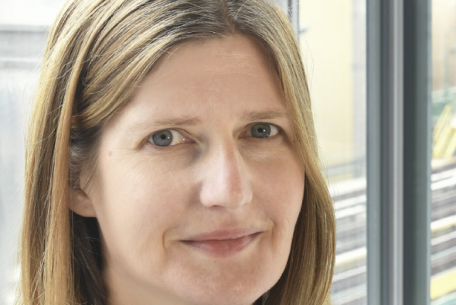
Elizabeth Hillman, Herbert and Florence Irving Professor, Mind Brain Behavior Institute
Elizabeth Hillman is a Herbert and Florence Irving Professor within Columbia’s Mind Brain Behavior Institute, and a Professor of Biomedical Engineering and Radiology. She joined Columbia in 2006, establishing the Laboratory for Functional Optical Imaging. She completed undergraduate and PhD training in Physics, Medical Physics and Bioengineering at University College London and Post-doctoral training at Harvard Medical School.
X. Edward Guo, PhD
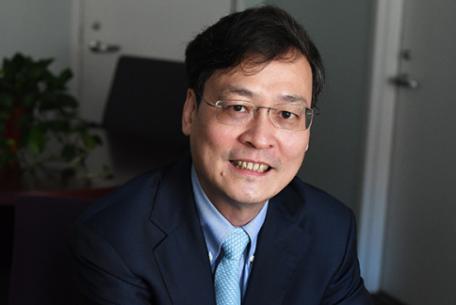
X. Edward Guo, PhD, Department Chair and Stanley Dicker Professor of Biomedical Engineering; Professor of Medical Sciences (in Medicine); Director, Bone Bioengineering Laboratory
Professor X. Edward Guo is currently Chair and Stanley Dicker Professor of Biomedical Engineering and Professor of Medical Sciences (in Medicine). He directs the Bone Bioengineering Laboratory in the Department of Biomedical Engineering at Columbia focusing his research interests in micromechanics of bone tissue, computational biomechanics, and mechanobiology of bone. His past honors include the Young Investigator Recognition Award from the Orthopaedic Research Society, the National Research Service Award from the National Institutes of Health, a CAREER award from the US National Foundation of Science, Funds for Talented Professionals from the National Natural Science Foundation of China, and the Christopher R. Jacobs Award from the Biomedical Engineering Society. Professor Guo is one of the founding members of the Department, and has served as its undergraduate Chair, ABET Chair, Vice Chair, and interim Chair. He was elected Department Chair in 2017. During his current tenure, the Department has risen to the top ten in the country.
Helen Lu, PhD
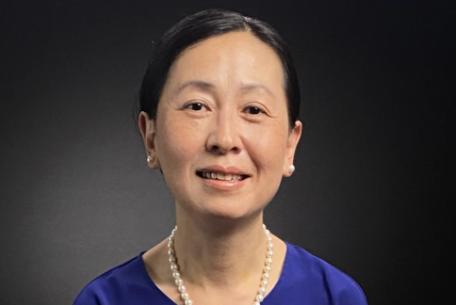
PERCY K. AND VIDA L.W. HUDSON PROFESSOR OF BIOMEDICAL ENGINEERING AND SENIOR VICE DEAN OF FACULTY AFFAIRS AND ADVANCEMENT
Helen H. Lu's research focuses on Orthopaedic Interface Tissue Engineering and the formation of complex tissue systems, with the goal of achieving integrative and functional repair of soft tissue injuries. Additionally, her research group is active in the design of novel biomaterials for orthopedic and dental applications. Her group has published extensively in biomaterials and tissue engineering, cell-material interactions as well as smart material design.
Lu is the inventor and co-inventor of more than a dozen patents and applications, and she has served on the editorial board of leading journals of the fields, including Tissue Engineering, Regenerative Engineering, Journal of Biomedical Material Research A, Journal of Orthopaedic Research, and is currently an associated editor for IEEE Transactions on Biomedical Engineering. Her research has been supported by the Whitaker Foundation, the Wallace H. Coulter Foundation, the Musculoskeletal Transplant Foundation, the New York State Stem Cell Initiative, the National Football League (NFL) Charities, the Department of Defense and the National Institutes of Health.
Lu’s research has also been recognized with many awards, including the Early Faculty Career Awards in Translational Research (Phase I and Phase II) from the Wallace H. Coulter Foundation and the Young Investigator Award from the Society for Biomaterials. She was honored with the Presidential Early Career Award for Scientists and Engineers (PECASE) at the White House in 2010, and was elected as a Fellow of the American Institute for Medical and Biological Engineering (AIMBE) in 2011.
Lu received her undergraduate and graduate degrees in Bioengineering from the University of Pennsylvania, and is currently the Professor of Biomedical Engineering and the Director of the Biomaterials and Interface Tissue Engineering Laboratory at Columbia University. She also received tenure at the Columbia College of Dental Medicine, and serves as a Provost Leadership Fellow at Columbia.
Nandan Nerurkar, PhD
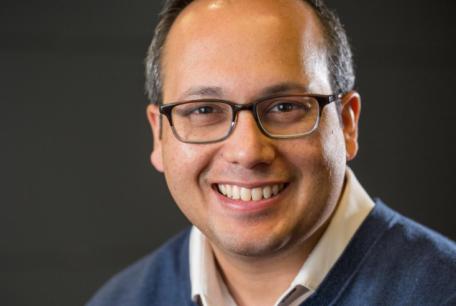
Nandan L. Nerurkar, PhD, Assistant Professor of Biomedical Engineering
Prof. Nerurkar received a BS in Biological Engineering from University of Maryland College Park in 2003, an MS in Biomedical Engineering from Washington University in St. Louis in 2005, and a PhD in Mechanical Engineering & Applied Mechanics from the University of Pennsylvania 2010. Nerurkar completed his training as a postdoctoral fellow in the Department of Genetics at Harvard Medical School before joining Columbia as an Assistant Professor in Biomedical Engineering in January 2018, where his lab studies the emergence of form during embryonic development using approaches from engineering and developmental biology.
Ke Cheng, PhD

Ke Cheng, PhD, Professor of Biomedical Engineering
Dr. Cheng is a Professor of Biomedical Engineering at Columbia University. He currently also serves as the Chair of the NIH Biomaterials and Biointerfaces (BMBI) study section. Previously, he was the Randall B. Terry, Jr. Distinguished Professor of Regenerative Medicine at NC State University and Professor in the UNC/NC State Joint Department of Biomedical Engineering. He also co-directed the NIH Comparative Molecular Medicine T32 Training Program and served as the Executive Director of Interdisciplinary Scholarship in NC State’s Office of the Provost. Research from Dr. Cheng’s lab has been summarized in publications in Nature Materials, Nature Nanotechnology, Nature Biomedical Engineering, Science Translational Medicine, Circulation Research, European Heart Journal, and more. Dr. Cheng is a fellow of the International Association of Medical and Biological Engineering (IAMBE), the American Institute of Medical and Biological Engineering (AIMBE), and the American Heart Association (AHA). Additionally, he currently serves as the Editor-in-Chief for Extracellular Vesicle (Elsevier) and Associate Editor for Bioactive Materials. Dr. Cheng has been devoted to the clinical application of stem cells and exosomes. He led several Investigational New Drug (IND) applications obtained from the FDA. The biotech companies he founded are developing stem-cell drugs and extracellular vesicles to provide better solutions for lung and heart regeneration, cancer therapy, and drug delivery.
Christine Chio, PhD
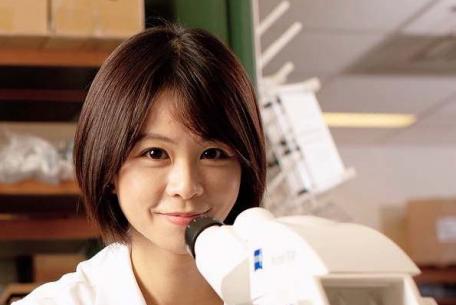
Christine Chio, Assistant Professor of Genetics and Development at Columbia University Irving Medical Center
Dr. Christine Chio is an Assistant Professor of Genetics and Development at Columbia University Irving Medical Center. Her research focuses on the roles of reactive oxygen species (ROS) and redox metabolism in cancer. One of her notable contributions is the elucidation of how reversible cysteine oxidation influences cancer cell survival through the regulation of transcript-specific translation. Using novel chemoproteomic approaches, her group recently discovered that the oxidation of proteinaceous methionine is highly site-specific and that the patterns of methionine oxidation change with cell state. This work sheds light on the significance of physiological redox switches that regulate biological processes like tumor development. Dr. Chio is supported by multiple NCI R01 awards and has received several awards for her work, including the DoD Career Development Award, the Pancreatic Cancer Action Network Catalyst Award, the V-Foundation Scholar Award, the Pershing Square Sohn Prize, the Paul Marks Scholar Award, the Ruth Leff Siegel Award for Excellence in Pancreatic Cancer Research, and the Irma Hirshl Award.
Raju Tomer, PhD
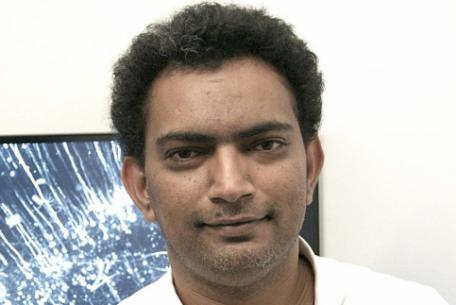
Raju Tomer, PhD, Associate Professor of Biological Sciences
Raju Tomer is an Associate Professor of Biological Sciences, focusing on advancing our understanding of complex neurological disorders. Dr. Tomer received his Ph.D. from EMBL Heidelberg, Germany, and completed his postdoctoral training at Stanford University. His research is centered on developing and utilizing advanced microscopy, tissue processing, rapid labeling, and data analysis tools for high-resolution mapping of large intact samples, such as Alzheimer's disease brain tissue. His lab is also pioneering novel 3D neuronal culture approaches for in vitro modeling of complex disorders, with a specific focus on schizophrenia and depression-associated network dysfunctions.
Nadeen Chahine, PhD

Nadeen Chahine, PhD, Associate Professor of Bioengineering (in Orthopedic Surgery)
Dr. Chahine is an Associate Professor in the Department of Orthopedic Surgery and has a faculty affiliation with the Department of Biomedical Engineering, Cellular and Molecular Physiology & Biophysics program, and the Columbia Stem Cell Initiative. She is Co-PI of the NIH funded Integrative Musculoskeletal Training Program (IMTP T32), focused on multidisciplinary training of pre-doctoral students in musculoskeletal research. She directs a multidisciplinary research lab and serves as the Associate Director of the Carroll Laboratories for Orthopedic Surgery at Columbia University Medical Center.

